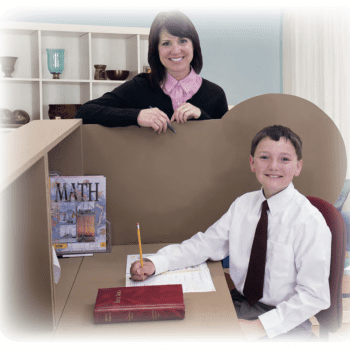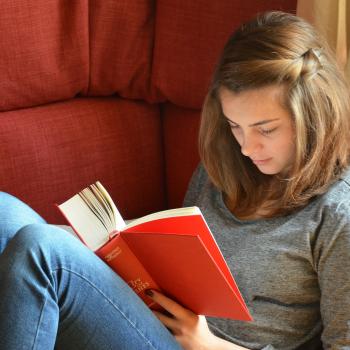I have mixed feelings about homeschooling, to say the least. While I find many, if not most, of the common criticisms of homeschooling to have some kind of validity, I still feel myself cringe when homeschoolers are caricatured as deranged fundamentalists since I know from experience that there is more to the story. My experience with homeschooling consists of extremely varied highs and lows—the highs of a dedicated and capable parent as a teacher, an education that fit with my self-motivated personality, and freedom from rigid schedules; and the lows of religious indoctrination and the personal struggles caused by living in an insular environment. If the good side of my homeschooling experience was very good—and it was—the bad side was very bad, and I still feel its effects to this day.
I was homeschooled for my entire lower-level education—kindergarten through high school—and in that time I knew homeschoolers from all sides of the social spectrum. I knew unschoolers, conservative Christians, liberal Christians, vaguely religious people, non-religious people, and even a Wiccan at one point (though I didn’t know what “Wiccan” meant until some time later). I knew people- or more accurately, the children of people- with a fairly wide range of beliefs and philosophies which had led them to homeschool, rather than just the evangelical families so well-represented in cultural tropes about homeschoolers.
But in spite of the diversity I was exposed to, my experiences have led me to be very suspicious of homeschooling in general, for a simple reason: in the homeschooling movement, the most extreme voices are the majority. There is a reason why the archetype of homeschoolers as fanatical morons is so popular. For every parent who chooses to homeschool for health reasons, extenuating circumstances, or educational philosophy (ie, that of unschooling), it seems like there are ten who homeschool because they are part of the fundamentalist or Quiverfull movements. Knowing what I know now about the history of homeschooling, this makes sense. After all, the Quiverfull movement openly says its goal is to produce large broods of future homeschoolers who will repeat the process over and over until they outnumber everyone else, and while the majority of Christian homeschoolers tend to be less brazen, they often only believe in milder versions of the same philosophies touted by Michael Farris and the other leaders of the Fundamentalist/Quiverfull movement.
Fundamentalist homeschooling is a poison. I say this from experience. It spreads like a virus, and not just among the conservative Christians who form its natural hosts. There are people of milder faith who get progressively sucked into more and more conservative elements of the homeschooling movement. Sometimes, through ignorance of fundamentalism’s real motives and philosophical underpinnings, a person can be lulled to sleep by the superficially attractive images of evangelical rhetoric and never notice the bigotry and delusion lurking right below the surface. I’ve seen it happen to people, and my mother was one of them.
As is probably typical for non-fundamentalists, many things contributed to my mother’s decision to homeschool me. Essentially, she believed- not without reason- that the public schools I would go to were dirty, violent, overcrowded, had poor curricula and bad funding. We couldn’t afford a private school, so she as a stay-at-home parent began to consider homeschooling.
By the time I had reached four my mother decided not to enroll me in preschool or kindergarten, and for the next three years did a wonderful job both educating me and socializing me with other children and adults. Even though I was an only child, I had a healthy and very normal social life, and was able to be educated above my age group, starting grade one at five years old. These were some of the best years of my childhood, and I still believe to this day that with sufficiently intelligent, caring and involved parents, early life education does not require formal schooling of any kind (although I see nothing wrong a with a good formal early education either).
After this successful start, when I had turned about seven, we decided to continue homeschooling through grade school. This marked the beginning of our brush with the conservative homeschooling movement. The HSLDA, which previously had been only an abstract form of social insurance to us, began to be a resource for our studies, and its sister organizations were used to help choose my formal curriculum. We spent a while before the start of my third grade school year deliberating on what system offered the best education, and ultimately decided on a hybrid approach. Other than the notoriously dry Saxon math textbooks, we chose a fundamentalist Christian curriculum called LIFEPAC and its digital equivalent, Switched-On Schoolhouse. This might seem incongruous, since we weren’t fundamentalists, but my mother was a religious conservative in the sense that she had a very hard time criticizing anyone who claimed to represent Christianity, and always gave religious individuals and organizations a great deal of respect even when her values were utterly opposed to their beliefs. She never looked beyond the very thin religiously moderate veneers that the HSLDA and other conservative Christian organizations put up, and so she assumed the curriculum was merely a good Christian education, and nothing more.
If the thought had ever crossed her mind that the curriculum I used for ten years would progressively harm me intellectually, psychologically and spiritually she would have thrown it back on the shelf in an instant. But as it turned out, this curriculum would prove to be the central destructive influence of homeschooling on my life. It was from these textbooks and lessons that I was poisoned by fundamentalism, and they are largely responsible for the part of my homeschooling experience which stunted my development and left me struggling with extreme self-doubt, self-hatred and depression as years went by.
The lesson plan started off innocuously—even with a bible study textbook as one of the main subjects (right next to science, history, and English), the first few grades were of decent quality and generally avoided controversial material. Thanks to excellent teaching I excelled consistently in my studies and everything seemed to be going well. But as the years went by, little oddities started to present themselves when I studied my textbooks or took lessons on the family computer. Starting around the sixth grade- once biology and astronomy became serious subjects- science seemed to take a strange path, and as grades progressed upwards the tone of the text became more and more defensive, with the writers eventually resorting to actually mocking biology and astronomy (evolution and the big bang were the biggest targets) rather than merely promoting creationism. The extreme immaturity of using mockery in a textbook apparently never occurred to the writers of the lesson plan. History not only consisted of the standard American whitewashing, which strains a person’s grip on historical facts badly enough, but also a Biblically literalist whitewashing, an almost colonial view of non-Europeans, and to top it off, no acknowledgement that anything over six thousand years old could exist at all. It is not an exaggeration to say that everything I actually know about history I learned outside of that curriculum, and that beyond certain parts about Rome, colonial Britain and early America, I have had to erase and relearn much of what I was taught to get an accurate picture of the world. As with the science curriculum, history lessons progressed in their deviance from standard textbooks over time, in this case by including slightly more biblical content in each grade level, marked as “history” right next to the founding of Rome or the pyramids of Egypt. Bible study, needless to say, was extremely focused on inculcating the “right” beliefs into students as quickly as possible and didn’t pull its ideological punches as much as the other subjects did. Although it did review the whole Bible (starting at about the 6th grade) it only did so in a literalist context, progressing in nastiness and pushiness by grade. All this time I had continued to use Saxon’s math textbooks—which I loathed, but did seem to work—and occasionally found myself welcoming their dry dullness near the end of the school day. Saxon didn’t preach—it merely made you fall asleep.
The curriculum as a whole struck very softly with indoctrination, couching it in well-written and produced textbooks as well as computer applications that included media and games. The packaging was, as a whole, fairly slick, and if you weren’t looking it was easy to miss the poison that peppered the whole thing.
In addition to the other beliefs I described, all the subjects I studied promoted complementarian sexism, sexual abstinence, chastity, Edwardian/Victorian style gender roles, human exceptionalism, and of course Biblical Literalism, though they all did so in different ways. What strikes me now is how subtle some of this propaganda could be- it was even present in English class, not only in the books on the required reading list but occasionally written bluntly between otherwise unrelated text in the middle of a lesson. Now and then harsh Bible quotes would appear beside inspiring ones, as if in warning, and heaven, hell, angels and satan were all real characters in the context of the textbooks.
Before I make this look too bad, though, I have to say that I didn’t even notice much of this until the last years of my education, although I always noticed, ignored and then tried to forget all kinds of little doubts I had about what I was learning. I read voraciously, including many science and history books that contradicted what I was taught, but until I became an older teenager I never really paid much attention to the contradictions, and through some kind of double think held that both ideas could be true. My mother remained an excellent teacher, I continued to hold a healthy social life, and I was otherwise quite whole as a person. Because fundamentalism only came from one part of my life and it was not promoted—though it was also never criticized—by my family, I had a lot more intellectual freedom than do most of the children who use this kind of curriculum. While some problems were simmering within me, my middle school life was overall a good experience even with my inane curriculum.
Personal issues during my high school years finally drove me to look back on, question and eventually discard the philosophy I was taught. A move to a faraway state had left my social life in tatters and it never recovered for the rest of my teenage years, I was forced to realize my own sexuality (both the existence of a sexual instinct itself, and that I was bisexual), I learned enough about real science and history to know that my education had not given me the whole truth, and I began to realize the terrible cruelty and undesirability of the world that fundamentalism sets out before people. All the little doubts and moral outrages I had repressed over the years came flooding back piece by piece, and after a long and hard struggle that included four years of constant depression I left both the fundamentalist part of my education and religion in general, becoming a happier and better person for it.
Only a couple of years after that last break from fundamentalism, my feelings on homeschooling remain mixed because my experience was mixed, and while the high points were great, the low points could be awful and intolerable. My mother’s dedication and inherently tolerant and empathetic nature gave me not only a good basic education, but a diverse and varied social life, ethical feelings I could separate easily from religion, and intellectual freedoms that most homeschooled children never enjoy. But my curriculum, much of the media I watched or listened to, and the culture I grew up in contained no voices arguing actively against fundamentalism. Because of this, I became a host to the virus of religious paranoia and self-hatred, which I only recently managed to shake off enough to do things like write this essay. I was taught a much more warped perspective of history than even the average American middle school student, and my knowledge of useful science was very small until I studied real science for enough time to fix what my curriculum had broken. My relative intellectual freedom as a young child had left me well-prepared for this and I have managed to “catch up” without much fuss, but not everyone gets that opportunity.
Ultimately, I can’t say what my views are on what should or shouldn’t be legal in homeschooling. No matter what, I believe that there must be a strict basic code of regulations on homeschooling to prevent indoctrination and abuse, but I also understand the position of Germany and Scandanavia when they choose to simply ban it outright except in exceptional circumstances. I have met a few secular homeschoolers, unschoolers and other non-fundamentalist homeschoolers who have done well with their children’s education and have nothing to do with religion, let alone religious indoctrination. But the poison of religious fundamentalism is very potent, and the potential for even non-religious abuse within homeschooling is still high, regulated or not. I was a very loved and nurtured child in a relatively liberal household, and yet I suffered at least some of what children in deeply authoritarian Christian homes do. I can’t imagine what I would be right now if I had grown up in a family of true fundamentalists, Quiverfull members, or right-wing evangelicals. I can only say I’m glad that I didn’t.
———
Homeschooling has become a very polarized subject. It is my hope that the Homeschool Reflections series, made up of stories of actual homeschool experiences, both positive and some negative, may cut through some of the hyperbole. I have asked the respondents in this series to be analytical and to discuss both the pros and cons of their experiences, but I have not censored what they have written. My posting these stories should not be construed as endorsement the opinions expressed therein. What you read in this series will vary, but it is my hope that each installment will be thought provoking and have something positive to offer to the discussion.















